That day the fog gave a break, and the humidity that had painted successive mornings of white and grey, gave way to the sunlight that was incredibly pleasant on the afternoon that we had arranged to meet in the garden, in front of Santa Maria Hospital. And there, seated with the due distance, we talked about the experience of the internship and remembered the most remarkable moments of a cycle that is coming to an end.
Marta Santos is 23 years old and in the final stage of the Integrated Master Degree in Medicine. Last month, she took the stage at the João Lobo Antunes Auditorium to speak to new FMUL students on the first day of the Introduction Days, which marked the start of the academic year. On that day, and throughout our interview, she recalled the many times when, over the past five years, she thought she would not be able to make it, now being proud of the so much she has conquered until today.
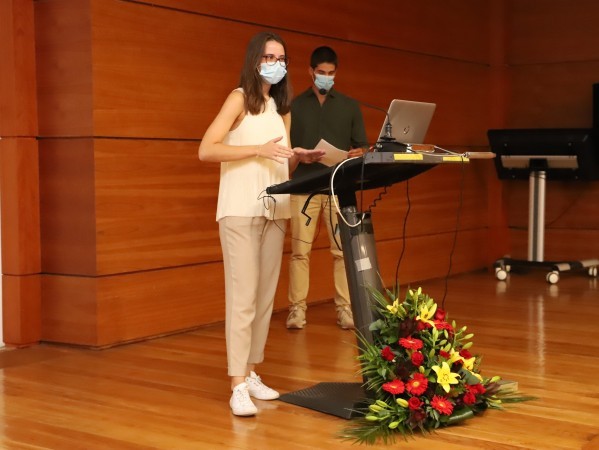
The invitation to share the experience of being a student at FMUL came from friend Francisco Baptista, who, as a student of the Pedagogical Council, was asked about potential students interested in playing this role in the inaugural programme of the academic year. He thought about his colleague Marta Santos who, after the first approach in a more informal tone, responded promptly to the official call. “He asked me if I would be available and I said yes. I remembered what my first day was and some things I would have liked to have heard, or I may even have heard, but on that first day we heard a lot and sometimes it is difficult to internalize what are the main points of what we are going to take for the rest of our journey. I tried to give my perspective, like at first I thought this, and then it was not quite like that, and if I could go back what could I have done differently”.
What she would not change, and Marta says it with strong conviction, is the choice to study Medicine at FMUL. She would make the same choice today as the “obvious” option of those who had decided to follow the passion for Sciences and for the anatomy of the human body, without thereby limiting themselves to “Laboratory life”, in the place that contains the largest hospital in the country, located “right there near home”.
“I never really knew what I wanted to do, but I always liked science. I remember, for example, that the part I liked the most in the Science and Environment subject was the study of the human body, I loved that, even today my family makes fun of me, because at dinner I talked about all the systems and organs. Still, I had never thought about medicine seriously, I liked science and even thought I would be a scientist”, she says, adding that when she had to choose she chose Sciences due to the scope of the study area itself. “I didn't want to restrict myself too much in high school, because I still didn't know what I wanted and when the time came to go to university, I ended up having an overall grade that allowed me to have some flexibility and be able to choose almost everything, and I started to think more about that I imagined doing in the future”.
At that time, and because she did not picture herself working in an office, and believed that full-time laboratory life could become “monotonous”, Marta found the right direction for her academic and professional career in Medicine - and in her passion for the study of the human body. "I was very afraid, because it is a very demanding degree and I was not sure whether I would have the discipline to study hard every day, always on top of things". However, as she started her studies, her growing commitment and dedication made Marta more and more involved, leading her to question how she had not realized that it was exactly what she wanted, “and now I cannot imagine myself doing anything else”, she says.
In retrospect, and if I could give some advice to Marta from the past, the 23-year-old girl who sat across from me on that sunny November afternoon, I would alert her to the reality and the challenges facing the medical profession nowadays. “When I chose Medicine, I thought it was a very easy choice to make. I thought, I will always have a job, it pays well, it is a safe choice, and today… I was also very uninformed, I have no one in the family connected to the Health area, I had no idea what this area is was like, nor the limitations that health professionals face”, she says, guaranteeing, however, that the knowledge acquired in this shock with reality did not make her regret the decision to study medicine.
“I don't think I would change my mind, but if I knew more, at least I would be more prepared for the difficulties. I thought the degree would be difficult, that I would study a lot, but then my life would be easy, it would be quiet, very well paid, with possibilities to work anywhere I wanted. It never crossed my mind that it could be a problem to get into the specialty we want, and today we know how things are. There are people who don't even have the opportunity to choose a specialty, let alone the specialty they would like. In addition, working conditions, unfortunately, are not that attractive, especially in the National Health Service, and although there is always a part of us that wants to stay in the NHS, managing things is difficult”, she stresses.
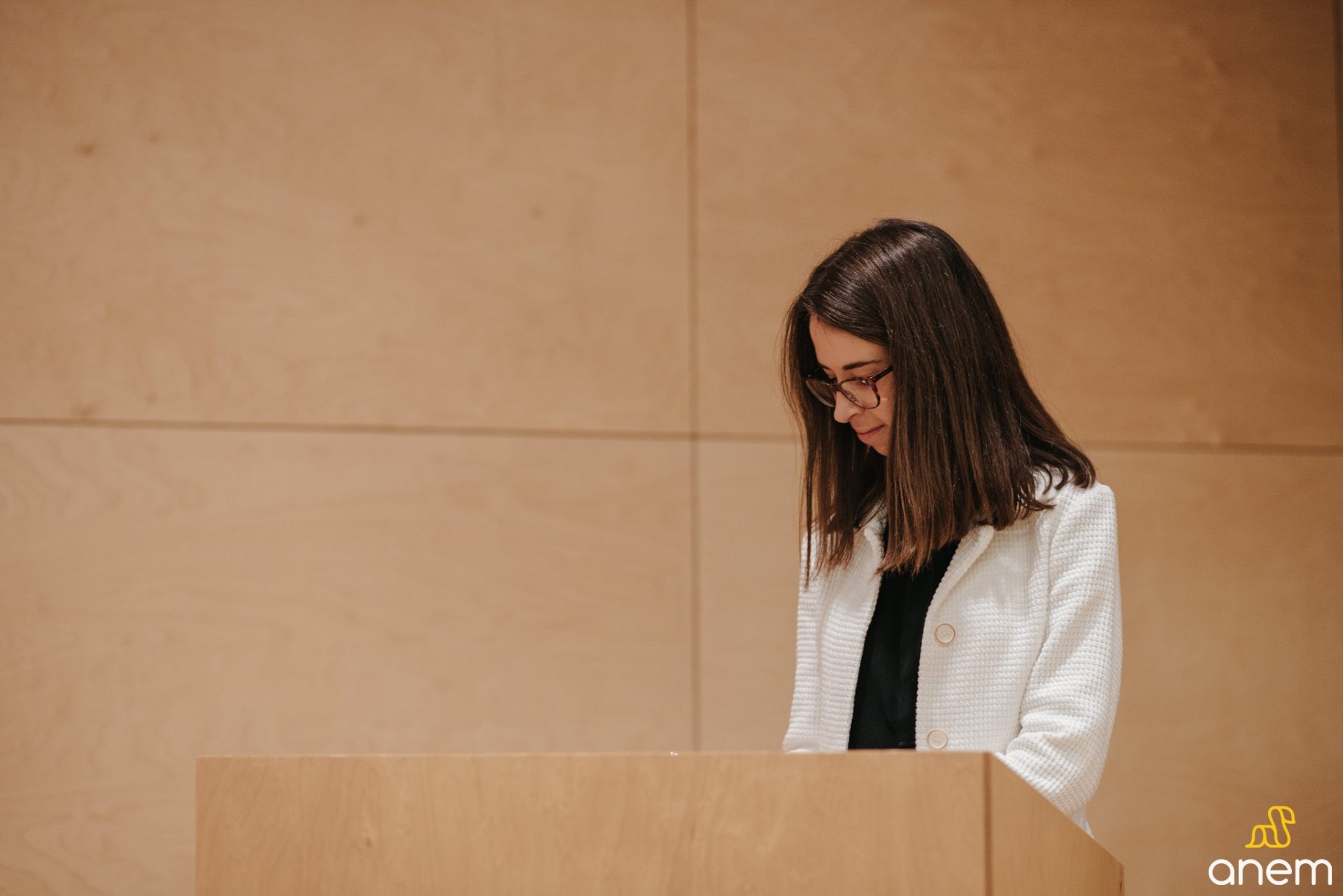
Medicine played a prominent role in Marta’s life, who ended up sacrificing some dreams, namely the desire to make a career in the world of music. Something that, she assures, would have left the Marta of the past quite surprised and upset. “When we focus more on a certain area, everything else ends up in the background. In my case, it was music. I always loved singing - I never played or learned any instrument, because I didn't have that possibility throughout my childhood - but I did participate in some television programmes and it was always something I imagined myself doing, but at some point I found that a singing career would be very unstable, something that I didn't feel confident about as a career and life option, and then it ended up being completely in the background and Marta from the past would probably have felt sorry for this artistic part to have been much abandoned”.
Despite the reality of the medical career being far from ideal, Marta says that she would choose Medicine "despite everything", because "there is nothing else that I feel would make me as fulfilled as I believe that Medicine will make me, despite all limitations, she states, adding: “I like people a lot, I like talking to people and helping them. And I think that applying this part of Science, which was what I felt was my strong point, to help others is what makes the sense to me”.
In turn, and despite the conditions imposed by the current pandemic, the clinical internship of year 6 is meeting the expectations of the student, who after the experience in the Paediatrics Service at Garcia de Horta Hospital, in Almada, returned to Santa Maria Hospital for direct contact with Surgery. I always thought that year 6 internship was going to be fundamental to understand how things, in practice, work. And when I saw what happened to my year 6 classmates last year, I thought it was catastrophic, but I always hoped that the same would not happen the following year, that is, that for us things were going to be different, because I realized that it was in their year that things exploded and the only way to deal with the situation, at a time when nothing was known, was to take a break and stop”, she said, revealing that she had hoped that “over the course of a year, we would be learning more about the pandemic, about the transmission of the virus, and that the new knowledge would allow us to adopt strategies to carry out the internship”.
Marta recognizes that she would be very disappointed with the impossibility of doing the clinical internship and is grateful for the opportunity to enjoy a unique learning experience. “It is great. I think this experience is very personal and the answers will vary a lot if we ask several colleagues from year 6. I loved the internship at Garcia de Orta Hospital. We always used individual protection materials, I never felt any limitations in what I could do and I felt that I learned as much as I would learn in a non-covid year. Now I'm here (Santa Maria Hospital,) in Surgery, and I've been in several surgeries. Basically, I have had a normal internship as far as is expected for a year 6”, she said with evident satisfaction.“ “Maybe there are fewer patients than there would be in a normal year, but I think there are enough for us to gain this understanding of how things work. And in practice, we are starting to learn, but we still have to study a lot. Later, when we are interns of the common year and we are real doctors, then the practical component will increase more and more, but, at this stage, I think it is fundamental to consolidate a lot of what we have learned, because only with a good theoretical basis we can move forward. So, year 6 still requires a lot of studying, not least because preparation for the exam is necessary, and so far it has been going as I expected.”
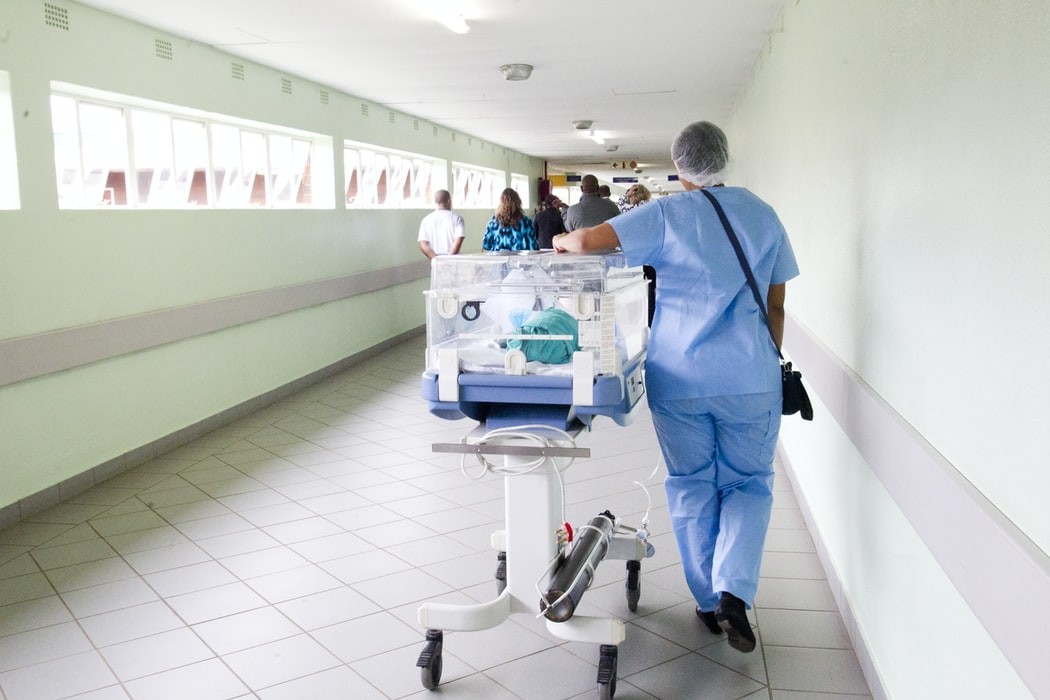
Regarding the impact of the pandemic on medical education, Marta says that it was colleagues from years 4 and 5 who felt the biggest shock due to Covid-19. “I think, above all, of year 5 students at the moment. In year 4, they had almost no practical training, now in year 5, practice is very, very scarce. I would not like to be in their shoes and I think they are the most affected, because that first contact with practice is fundamental for us to start getting used to it, in addition to having a certain personal motivation, even to realize what is most important when studying. If the vaccine emerges in a semester and the situation normalizes minimally, the colleagues of the current year 4 still have year 5 to make up for it, but those who are now in year 5 end up being the ones who suffered the greatest impact”.
There is still uncertainty about the specialty she will choose in the future, but given the prevailing competitiveness, Marta prefers to keep all options open, not least because an open mind responds more effectively to unforeseen events or unwanted events. “It is still unknown and there is a lot of uncertainty and competitiveness when choosing the specialty. I think we all try, more and more, to keep our mind as open as possible, because it becomes very hard if we cling too much to an idea or to a specialty, since the choice is based on the grade, and what we want may not be possible. I have this fear a lot”, she confided, reiterating that year 6 is a very demanding year at several levels. “I'm still at the beginning and I'm not sure yet, but I have friends who are now finishing - they will take the exam at the end of November - and it's a year that is always described as being very hard. That view that "if it doesn't go well, it can be repeated" is not that linear", she says, warning about the" very heavy emotional weight" year 6 students experience. “All the fear due to the possibility of the exam being postponed had an enormous emotional and psychological impact on the students who finished year 6 last year, so it is in fact an exam that has a very big impact on us and I think we all prefer to keep our possibilities open so as not to be disappointed”.
But supposing, for a brief moment, that there was no obstacle or limitation in choosing the specialty, which way would it tip? The difficulty in answering the question clearly is justified by the fact that she has not yet experienced the practical component of her chosen specialty: Gynaecology-Obstetrics. “In my year 5, I was going to have Gynaecology-Obstetrics, but that didn't happen. So, I just studied the theory. I like it a lot and it is something that I would conceptually like, but it is very difficult to say if I really like it before going doing the internship that I will do now in year 6. For example, I thought that I did not like Paediatrics at all, there was no way, I could not talk to the parents. However, I did the internship and I really liked it. I even thought I was good at it after all”, she said laughing.
While waiting for the Gynaecology-Obstetrics internship to clarify ideas, Marta sees herself as a specialist in General and Family Medicine. “If I have a high score in the exam, I will have more choices and I will make my choice depending on the available possibilities, but General and Family Medicine is, in fact, a specialty that I ponder even for the sake of quality of life, because the perception that we have (I haven’t talked much with experts about this yet and will do so in due course) is that it turns out to be a specialty that provides a better quality of life than hospital specialties, which are more demanding in terms of schedules. In addition, General and Family Medicine is very interesting in the sense that we see pregnant women, children, adults, we see all kinds of pathologies, we follow the family, and I think that is very interesting”, she adds, imagining with visible enthusiasm the possibility of following-up a person from birth to adulthood.
It is not just the passion for contact with people that entices Marta to make a career in General and Family Medicine. Recognizing the vital role of primary health care in society is a very compelling factor. “I think it is essential to have good primary health care, family doctors who are truly passionate about what they do, so it is also an area where I see myself and where I would very much like to do a good job, because I think we should invest on primary health care and that is one of the aspects to improve in our National Health Service”, she says. She states that“ hospitals are clogged with patients who are not referred and sometimes we even see doctors upset at patients because they had no reason to come to the emergency room, but people, effectively, do not have access. Sometimes, it is really chaotic to be seen in a primary health care consultation and people do not have the literacy that we have, they have no idea what is serious and what is not, and they come to the emergency room because they have no option”.
And to solve the problem of the overload of this service, Marta points the way to education. “There has to be training for the population, giving them health literacy to know when they should go to the emergency room and when they should go to primary health care. But it is also no good telling people to go to the health centre and then there is no answer, so this has to change a lot”.
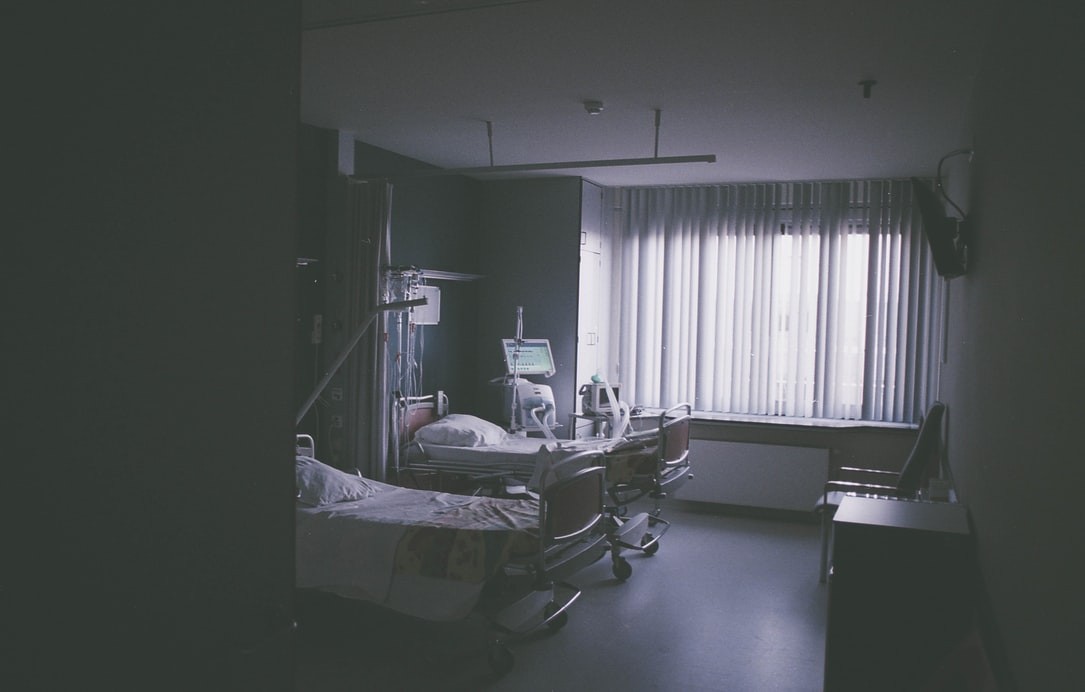
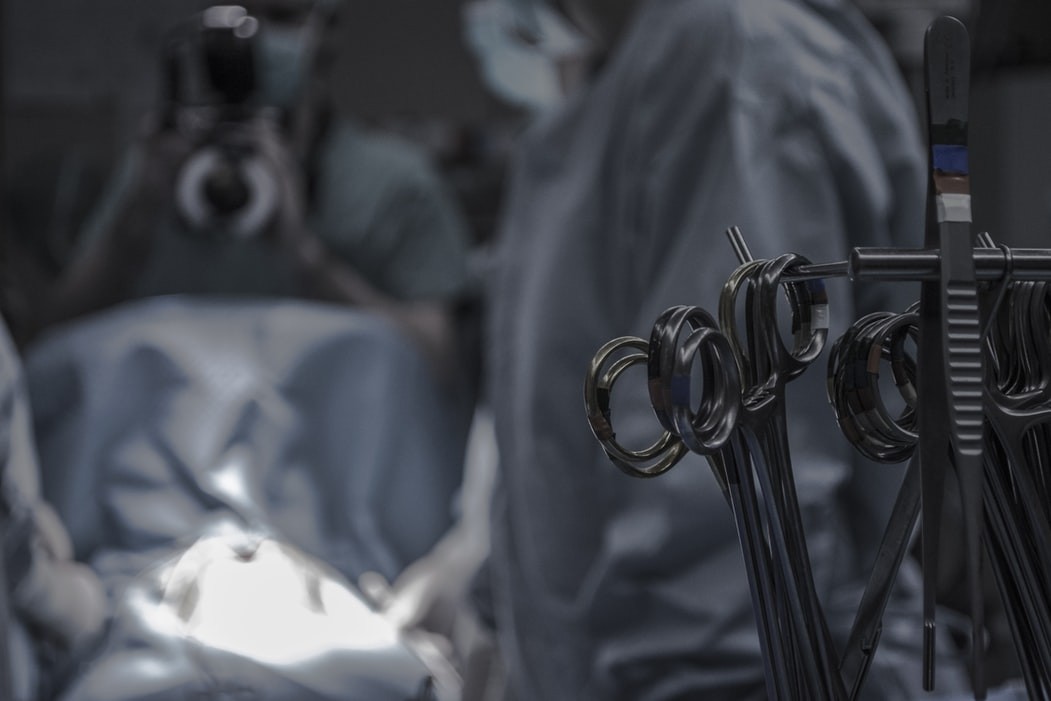
The state of health in our country was one of the topics of our interview, in which I tried to understand which strategies Marta would consider to be the most suitable to improve the response of the National Health Service. And if on the one hand, the increase in incentives for attracting health professionals and maintaining the quality of the NHS was the first measure pointed out by the student, also communication between teams emerged as a point of intervention, in order to promote greater harmony and team spirit, developing leaders and more competent and balanced professionals.
“It is absurd how we have one of the highest number of doctors per 100,000 inhabitants in Europe and at the same time we have the SNS in the situation it is in. And now with COVID, the problem is not the lack of ventilators, it is the lack of people to operate them. There are no professionals with the necessary availability and skills to handle the ventilators and this is serious for me, considering that we are one of the countries with the highest number of doctors. So where are they?” The answer is already well known to all, they are in the private sector or abroad, which is the option of many doctors who choose to leave their country to pursue their ideals.
“And before we criticize the people who make these kinds of decisions, we must also ask ourselves why they make them. At this moment there is great dissatisfaction on the part of the health professionals who work in the National Health Service, who do not feel rewarded and have no quality of life. There are many demands on those who stay, who end up giving a lot and giving up a lot in their life. And this turns out to be a snowball”.
In Marta's opinion, it is urgent to make the NHS “more competitive versus other available offers”. For her, poor human resource management is the main gap in the current Portuguese health system. "Often, we see that the operating rooms are not always occupied, that is, what we need is people".
As a student, Marta says that she does not feel the effects of poor management in terms of effectiveness and that has destroyed the potential of our NHS. She says that the dissatisfaction of the doctors and professionals that she has met along her academic path is evident, even though she lacks the perception of “what the source of this dissatisfaction is”. A dissatisfaction that translates into demotivation which, according to Marta, does not go unnoticed. “There are some things that I can point out and understand. There is the salary issue, they often feel that they are not properly paid, especially in terms of the hours they work overtime and that are often exchanged for potential breaks that end up never being taken, because otherwise the services would stop”. Too much work is also a reason for discontent. “It is very demanding for many specialties, they are asked to work too many hours. We can refuse up to a point, but it is also difficult to do so, because we know that there are patients who depend on us. On the other hand, it becomes a great burden and people end up getting very tired, because they are asked to do too much. I know of doctors and colleagues who work 80-90 hours per week and this is very demanding. Of course, they are paid, but not in terms of what is required, so I think there is this duality. In addition, the teams are not always welcoming, that is, sometimes there are teams that do not work very well together and it is necessary to understand why some health professionals are not so good in terms of personal relationships, not so much in favour of the sick. What happens is that, sometimes, there are frictions in several teams due to various reasons and that should be addressed.”
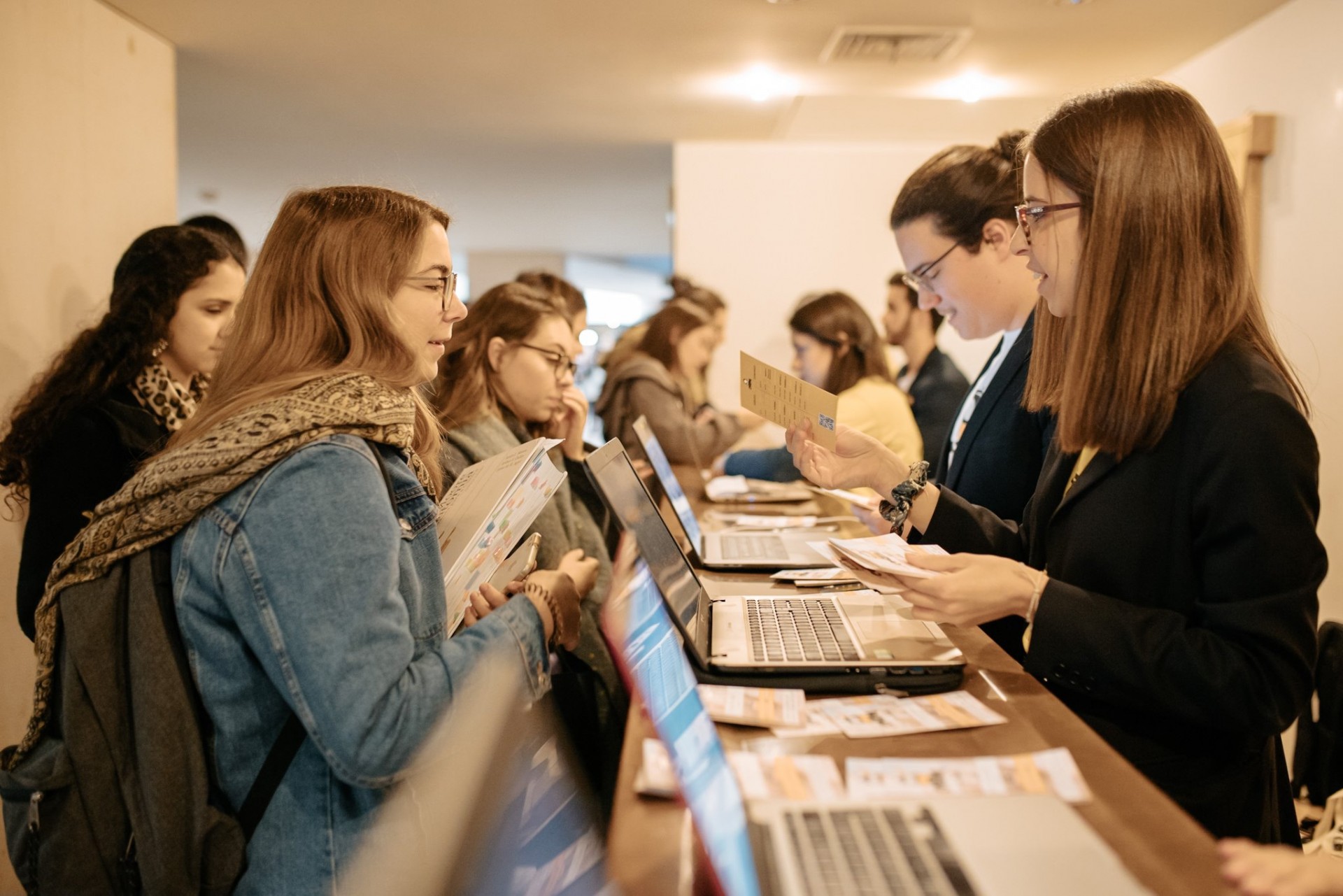
Marta at the National Congress of medical Studentes, in 2019
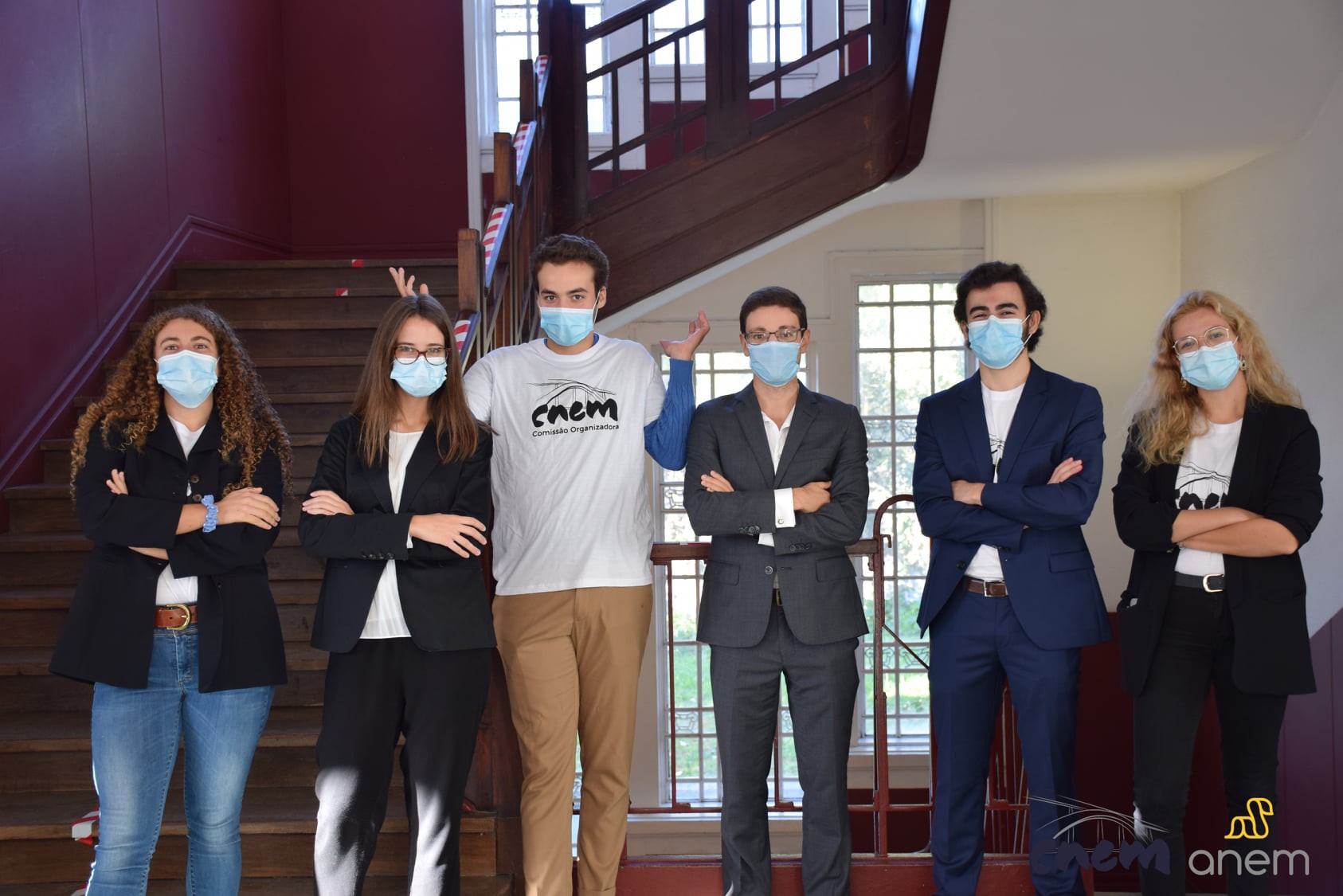
With colleagues at the National Congress of medical Studentes, in 2020
When thinking about the future, Marta wonders if there will be room and opportunities for associative activities in her life. On the day she learned that she had been accepted in the medical degree, her focus was entirely on the study and discipline necessary to be successful in this mission. She did not think about getting involved in faculty projects, joining major causes and carrying friendships and lessons for life. “When I joined the faculty, I was very focused on medicine. Gradually, and under the influence of my friend Francisco, I dedicated myself to some projects, especially AIMS. He belonged to the Organizing Committee and challenged me to join the task force just to try it out. And I really liked it”. In the following year, Marta joined the Organizing Committee of AIMS and from there, she did other thinks, including in the ANEM.
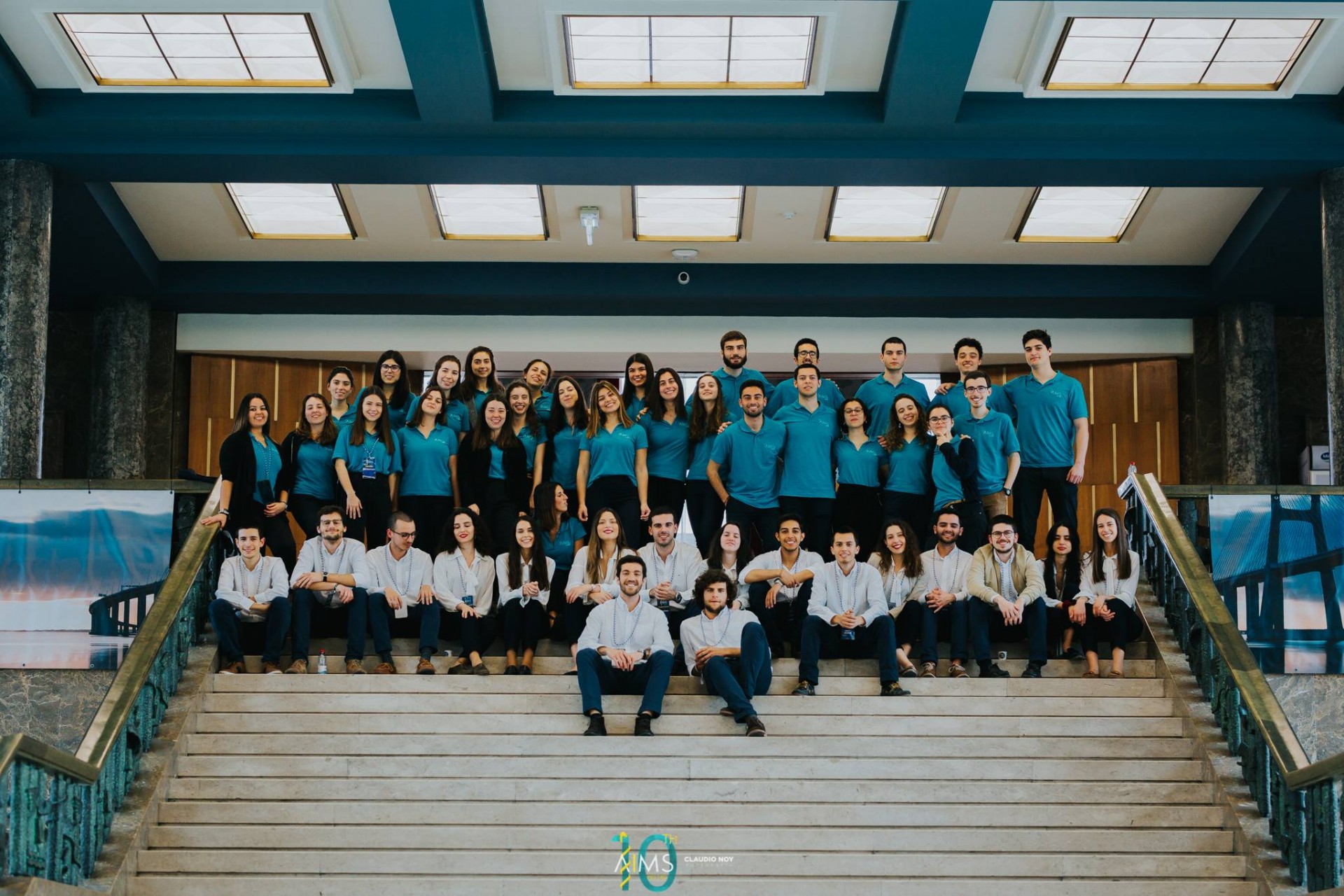
Marta with her AIMS Metting colleagues, in 2019

In revisiting the last years of her life, moments and people who won a special place in her young and avid heart came to her mind. Marta also recalled the experiences of an agonizing year 1, during which she crossed some barriers of terror, doubting at times whether she would be successful in the tests that life threw at her. “Year 1, especially the Anatomy oral examination, was the worst. I will never forget the anguish I felt on that day and throughout this entire year. It was, in fact, a terrible year, I only thought about the oral examination. After doing the first, I thought I would be calmer in the second. But no! In June, there I was again shaking like a leaf. I almost threw up. Horrible! It was a claustrophobic year for me. Everything was new and the teaching pace was totally different from high school. I really thought I was not going to be able to do it, and I got it into my head that either I would kill myself studying every day or I would never get there, and I still had doubts”, she stated with the lightness of those who proved to herself that nothing fails when the will to win is always stronger than the fear of failure.
Marta recalls with some nostalgia the long evenings spent studying at the Library, on the 6th floor, the year 2 Microbiology classes with Professor Thomas Hanscheid (“my favourite subject in the entire faculty, the one I had the most pleasure in studying and learning”), the dinners with friends and the challenges she overcame in coordinating AIMS. Marta shared the most remarkable moments she lived at the Faculty of Medicine of the University of Lisbon.
“I had a lot of ups and downs at AIMS, because it is an event that is at the highest level, it is very demanding. I was in the fundraising and partners part, so I had to ask for a lot of things, sometimes I thought it wasn't even reasonable, but in the end people gave. It was a moment of great learning for me to realize that if we don't fight for something, we won't have it and if we don't believe we deserve it, nobody will give it to us either”.
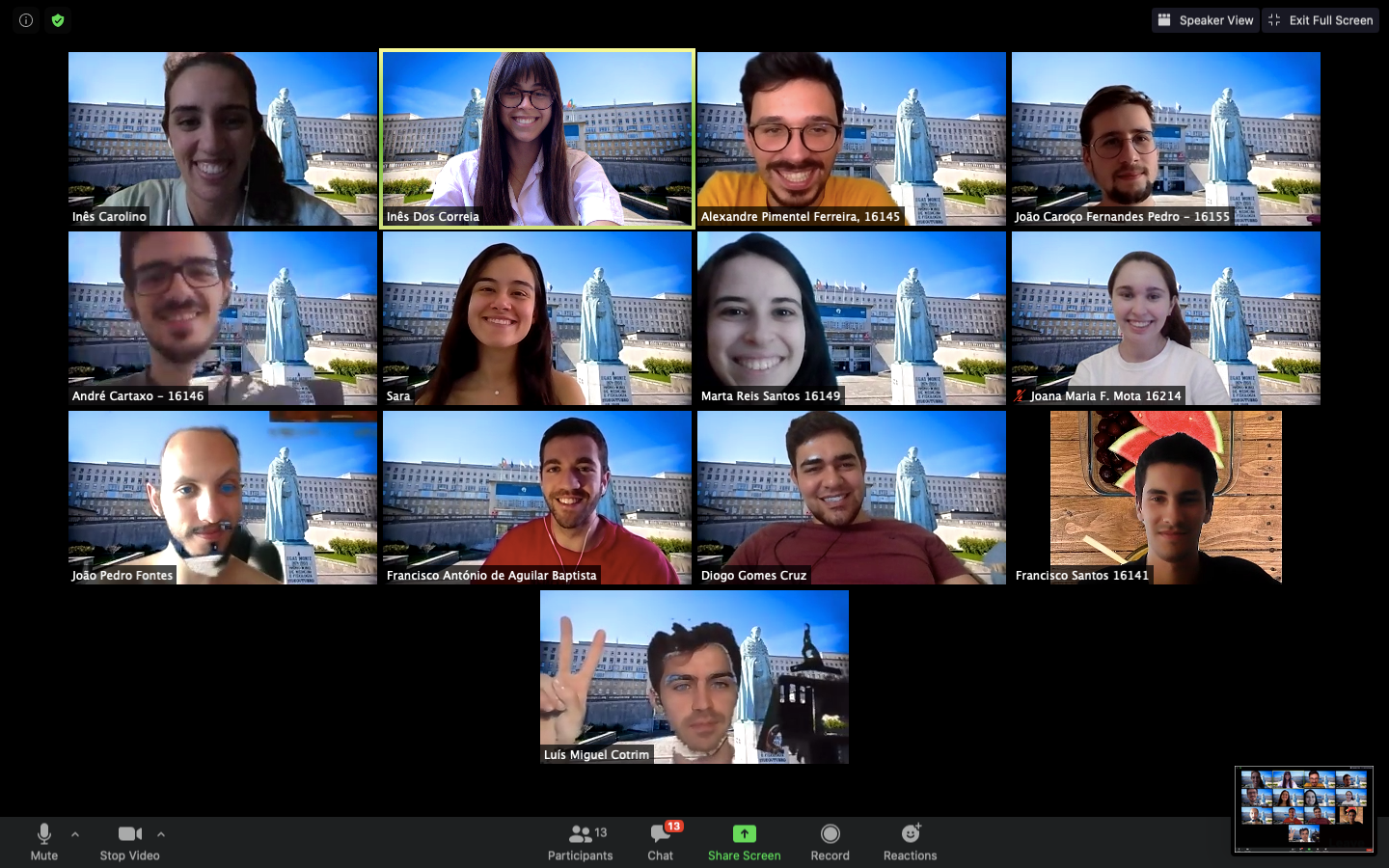
On video conference with friends an colleagues from FMUL

Exchange program in Brazil
Valuing and deserving were important lessons for her. “The exchange in Brazil was also a wonderful experience. I was there a month, in the Emergency Room, and it was an enriching experience. The organization is completely different from ours. We had inpatient rooms in the Emergency itself, which were almost wards and it was very interesting to acquire some practical knowledge there, because there was greater opening for this since year 5, there is greater autonomy”.

When we have company, the journey becomes more pleasant. It's all easier when we have the right people on our side and Marta shares that opinion. “I am very unhappy, because now we cannot study together at the faculty. We were always the team that studied here, together, all the time. It has always been simpler for me. It is true that I do not focus as much as if I were at home alone, but I would rather lose some study, which was not so intensive, but I was happier because I was with them. It was ideal, now it is more complicated”.
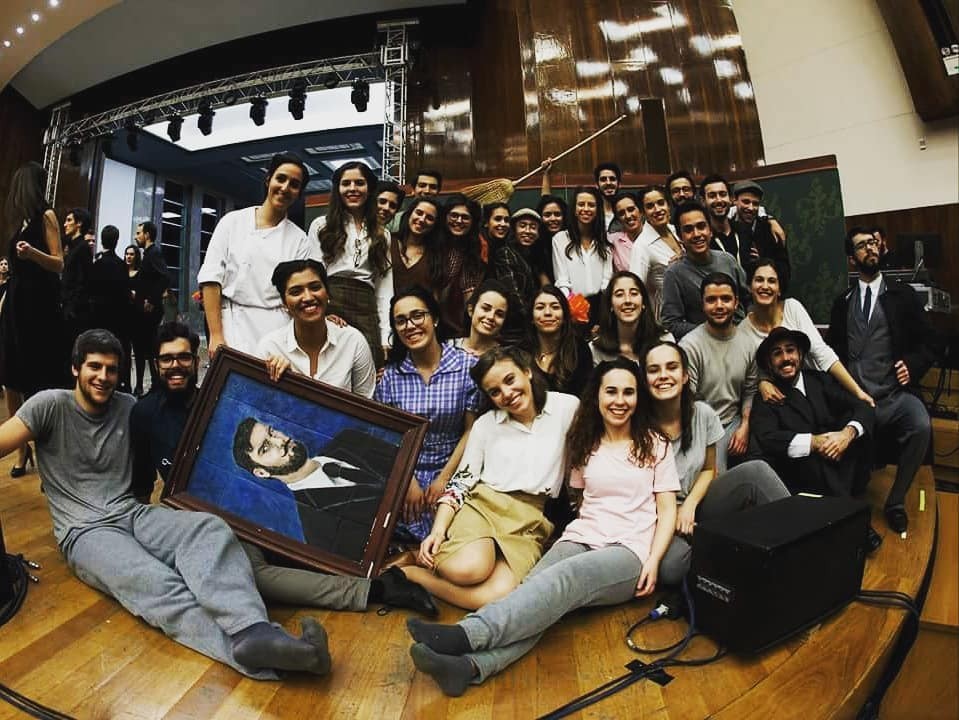
Sofia Tavares
Editorial Team

